Philadelphia and Tchaikovsky's Charm
This is an expanded version of an article published in the Broad Street Review.
The American Tour
This is an expanded version of an article published in the Broad Street Review.
The American Tour
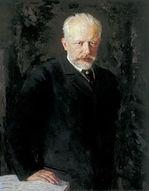
On May 18, 1891, at 3 o’clock, a temperate and lovely, partly cloudy spring day, Pyotr Ilyich Tchaikovsky arrived in Philadelphia by train and without fanfare. There was to be an evening concert of his music at 8 o’clock. That performance would be the last he would conduct in the United States, a dervish tour that began on April 26 in New York City, where he had been invited by Walter Damrosch, director of the New York Symphony for the grand opening of what was then called “Music Hall”—later to be formally designated as Carnegie Hall—an invitation supported by no less a luminary than Andrew Carnegie himself.
New York City
In New York, Tchaikovsky was celebrated and fêted and fed enormous amounts of food and alcohol by Carnegie and the musical haut monde of the city. On May 8, the day after his 51st birthday (which passed almost unnoted by anyone), he wrote in his diary following a meal with Carnegie “The supper was hearty, but the cuisine is American, i.e. unusually repugnant. Much champagne was drunk.” In the same entry he noted:
New York City
In New York, Tchaikovsky was celebrated and fêted and fed enormous amounts of food and alcohol by Carnegie and the musical haut monde of the city. On May 8, the day after his 51st birthday (which passed almost unnoted by anyone), he wrote in his diary following a meal with Carnegie “The supper was hearty, but the cuisine is American, i.e. unusually repugnant. Much champagne was drunk.” In the same entry he noted:
Mr. Romeike sends me daily piles of newspaper clippings about myself. All of them without exception are laudatory in the highest degree. The Third Suite is praised to the sky, but hardly more than my conducting. Is it possible that I really conduct so well? Or do the Americans exaggerate?!!
The New York Critics
Notoriously shy and uncertain about both his works and his conducting skills, he was nevertheless described by the newspapers as ranking “among one of the foremost composers of our age,” introducing the concertgoer to music that was, according to the critics, “fresh,” “modern,” “ gorgeous,” “strange, “ “startling,” “sensuous,” “bold,” “splendid,” “melodic,” “inspiring,” “original, unique, full of color,” “magnificent,” and “marvelous,” among other superlatives (there were a lot of newspapers back then), and where, Tchaikovsky discovered—much to his surprise and as he wrote to his brother—“It turns out that in America I am far better known than in Europe. Here I’m an important bird!”
Baltimore and Washington, DC
Following his extraordinary success in New York, he took a relaxing side-trip to see Niagara Falls and then traveled to Baltimore (May 15, 16), where he also conducted his own music. The Baltimore Sun praised his conducting and his music, “full of fire and dash of the Russian, the finish and scholarly workmanship of the master, and the intelligence and refinement of the artist musician,” and The Baltimore American called him “a czar among musicians and directors,” the concerts “among the best ever heard here.”
From Baltimore he traveled to Washington, DC, to be entertained with music, including some of his own, at the Russian Embassy. He was relieved to converse in his native Russian, although upon greeting the embassy secretary with a vigorous Russian kiss, he was mortified to discover that the kiss had dislodged a loose tooth. He became self-conscious lest people notice the resulting sibilant “ch, sh, shch, hiss and whistle” that the lost tooth gave to his speech.
Notoriously shy and uncertain about both his works and his conducting skills, he was nevertheless described by the newspapers as ranking “among one of the foremost composers of our age,” introducing the concertgoer to music that was, according to the critics, “fresh,” “modern,” “ gorgeous,” “strange, “ “startling,” “sensuous,” “bold,” “splendid,” “melodic,” “inspiring,” “original, unique, full of color,” “magnificent,” and “marvelous,” among other superlatives (there were a lot of newspapers back then), and where, Tchaikovsky discovered—much to his surprise and as he wrote to his brother—“It turns out that in America I am far better known than in Europe. Here I’m an important bird!”
Baltimore and Washington, DC
Following his extraordinary success in New York, he took a relaxing side-trip to see Niagara Falls and then traveled to Baltimore (May 15, 16), where he also conducted his own music. The Baltimore Sun praised his conducting and his music, “full of fire and dash of the Russian, the finish and scholarly workmanship of the master, and the intelligence and refinement of the artist musician,” and The Baltimore American called him “a czar among musicians and directors,” the concerts “among the best ever heard here.”
From Baltimore he traveled to Washington, DC, to be entertained with music, including some of his own, at the Russian Embassy. He was relieved to converse in his native Russian, although upon greeting the embassy secretary with a vigorous Russian kiss, he was mortified to discover that the kiss had dislodged a loose tooth. He became self-conscious lest people notice the resulting sibilant “ch, sh, shch, hiss and whistle” that the lost tooth gave to his speech.
Philadelphia
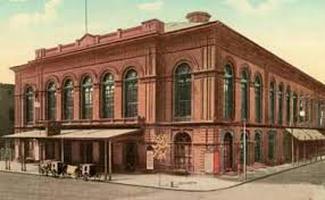 The Academy of Music, Broad and Locust Streets
The Academy of Music, Broad and Locust Streets
Tchaikovsky was a prodigious letter-writer who also wrote conscientiously in his diaries. In a letter to his nephew, he assured him that during this visit he would be “keeping a detailed diary from day to day, and when I come back I’ll give it to all of you to read.” His diary entries for all the cities are detailed and fascinating—with the exception of Philadelphia. This was probably due to the brevity of his stay here (he arrived and departed on the same day), as well as this stop being the tail-end of a long and exhausting tour. Indeed, he ends his Philadelphia entry with:
After the concert [at the Academy of Music], was in a club [the Utopian] according to the promise I had made before. The return trip to New York was very tiresome and complicated. …The ride home with Aus der Ohe [the soloist in that evening’s performance of the Piano Concerto No. 1] was endless. It has become impossible to write in detail.
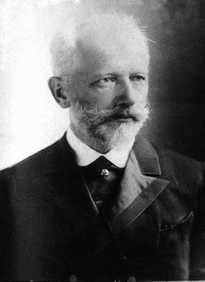 Photograph by Napoleon Sarony in New York, 1891
Photograph by Napoleon Sarony in New York, 1891
The Philadelphia Critics
Fortunately, none of Tchaikovsky’s fatigue was noted by the newspapers, likely because he had taken a long walk between his arrival and the concert. Daily walks whether at home or abroad were a long-established habit of his, particularly when composing, and he found them stimulating.
Two of the newspapers noted his appearance in a similar manner: the Daily Evening Telegraph said, “He looks like a broker and clubman rather than an artist,” and the North American said he looked “more like a prosperous merchant or a United States Senator.” The Telegraph went on to say, “He is of middle height, slim, erect, with silvery gray hair and beard, florid complection [sic], and small but piercing and expressive blue eyes: a self-contained and dignified personage, not without grace,” and all praised his conducting style, The Philadelphia Inquirer calling it “dignified, and at the same time thoroughly alert in watching every portion of the orchestra throughout the score.”
The two Tchaikovsky works performed were the Serenade for Strings, Op. 48; and the now even more famous Piano Concerto No. 1* in B-flat minor, Op.23. About the concerto, the Inquirer said:
Fortunately, none of Tchaikovsky’s fatigue was noted by the newspapers, likely because he had taken a long walk between his arrival and the concert. Daily walks whether at home or abroad were a long-established habit of his, particularly when composing, and he found them stimulating.
Two of the newspapers noted his appearance in a similar manner: the Daily Evening Telegraph said, “He looks like a broker and clubman rather than an artist,” and the North American said he looked “more like a prosperous merchant or a United States Senator.” The Telegraph went on to say, “He is of middle height, slim, erect, with silvery gray hair and beard, florid complection [sic], and small but piercing and expressive blue eyes: a self-contained and dignified personage, not without grace,” and all praised his conducting style, The Philadelphia Inquirer calling it “dignified, and at the same time thoroughly alert in watching every portion of the orchestra throughout the score.”
The two Tchaikovsky works performed were the Serenade for Strings, Op. 48; and the now even more famous Piano Concerto No. 1* in B-flat minor, Op.23. About the concerto, the Inquirer said:
The piano part was played by Miss Adele Aus der Ohe, one of the best pianists in the country, who has made a marked impression wherever she has appeared. … she seemed inspired by the presence of the composer. The long and difficult composition was played without notes, and at its conclusion she was congratulated by Tschaikowski [the newspaper’s spelling], whose face was one wreath of smiles. … It is spirited throughout, having in portions a martial character. … It is poetic, and Miss Aus der Ohe played it with great purity and delicacy. … The closing movement was full of color and spirit. The composer and Miss Aus der Ohe received genuine ovation. |
The Philadelphia Press reported, "The Academy of Music last evening contained a very large audience of music-lovers, who had congregated to do homage to one of the greatest living composers, Illitsch Tschaikowsky [sic]. The term concert is too modest to express the occasion; it was a musical festival." When Tchaikovsky escorted Aus der Ohe onto the stage, "a storm of applause burst from all parts of the house, which the composer acknowledged gracefully, although with the modesty of a schoolboy." The concerto was a hit:
From that moment audience, orchestra, and soloist seemed to recognize that they were in the presence of genius, and Miss Aus der Ohe rendered the composer's concerto with such artistic merit that her numerous admirers had ample cause to think that she excelled any of her previous efforts before an American audience. Her great technique and wonderful endurance stood her in good play in this extremely difficult composition, and her masterly rendering brought forth applause from even the composer.
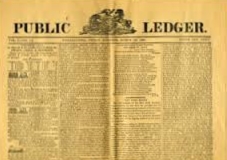
The Philadelphia Public Ledger was no less enthusiastic: "Tschaikowsky [sic] lent more than his name and personal exhibition to the concert given last night at the Academy of Music. ...he made the occasion remarkable by conducting two of his own compositions." Once more, those conducting skills about which Tchaikovsky himself called into doubt so often were praised in superlatives:
He is an energetic and authoritative conductor, and under his direction the men evidently felt the spirit of his music as they could not have felt it under another leader. ...With Miss Adele Aus der Ohe at the piano, almost uniformly at her best in her execution, the concerto had unsurpassable interpretation, with the composer to emphasize its character and bring out its inmost beauties. This was done with a brilliancy, boldness and delicacy that stirred the audience to genuine enthusiasm. Miss Aus der Ohe and Tschaikowsky were called before the house three times and almost overwhelmed with applause, and each deserved it all the more because each endeavored to put the other most prominently forward as the deserving recipient of the honors.
Tchaikovsky’s Last Song
Remarkably, this may well have been one of the very last times in the United States that the Piano Concerto was performed as Tchaikovsky intended! Tchaikovsky died much too young, a scant two years after this tour, in 1893—from the effects of cholera modern scholarship concludes, and not from suicide, as multiple proliferating myths have proclaimed.
During this tiring but exhilarating journey, Tchaikovsky wrote to his beloved nephew, Vladimir Davydov, “If I were younger, I would probably derive great pleasure from staying in this interesting, youthful country. … I foresee that I will recall America with love. They have truly given me a fine welcome here.” It seems as though America has returned that love.
Remarkably, this may well have been one of the very last times in the United States that the Piano Concerto was performed as Tchaikovsky intended! Tchaikovsky died much too young, a scant two years after this tour, in 1893—from the effects of cholera modern scholarship concludes, and not from suicide, as multiple proliferating myths have proclaimed.
During this tiring but exhilarating journey, Tchaikovsky wrote to his beloved nephew, Vladimir Davydov, “If I were younger, I would probably derive great pleasure from staying in this interesting, youthful country. … I foresee that I will recall America with love. They have truly given me a fine welcome here.” It seems as though America has returned that love.
*NOTE: The Piano Concerto No. 1 has an interesting American connection as well. The world premiere took place at the Boston Music Hall on October 25, 1875. Hans von Bülow was the pianist, Benjamin Johnson Lang conducted.
Author’s Note: Special thanks to Barbara Parquette at the Philadelphia Free Library and Jeff Robel at NOAA/NCEI for their assistance in this project.
Author’s Note: Special thanks to Barbara Parquette at the Philadelphia Free Library and Jeff Robel at NOAA/NCEI for their assistance in this project.
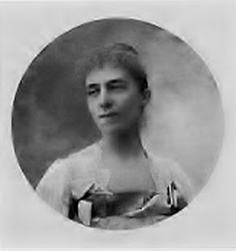
 RSS Feed
RSS Feed